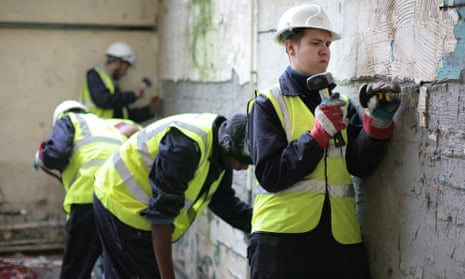Young people face the the worst economic prospects for several generations and their lives have got worse over the past five years, a comprehensive report has concluded.
The Equality and Human Rights Commission (EHRC) said that young people – defined as those under 34 – suffered the biggest slide in income and employment and now faced higher barriers to achieving economic independence and success than five years ago.
The period during which their fate has worsened coincides with the election of the Conservative-led coalition government in 2010.
The commission, which has a mandate from parliament to tackle discrimination, said that although life had become fairer for many, progress had stalled or even worsened for some groups in society.
The report, Is Britain Fairer?, showed that during the recession and up to 2013, people aged under 34 were hit by the steepest drops in pay and employment, had less access to decent housing and better paid jobs, and were experiencing deepening levels of poverty.
The unemployment rate for 16- to 24-year-olds stood at 14.8% for the three months to August, according to official figures, with some 683,000 classed as unemployed. That rate was higher than the 13.8% recorded for the three months to February 2008 – before the financial downturn struck.
EHRC commissioner Laura Carstensen said that while barriers were being lowered in some sections of society, young people in particular were having to cope with far more difficult circumstances.
“Theirs are the shoulders on which the country will rely to provide for a rapidly ageing population, yet they have the worst economic prospects for several generations,” she said.
TUC general secretary Frances O’Grady said the government could no longer afford to ignore the plight of young people, who were struggling to cope with low levels of pay, worsening employment prospects and rising housing costs.
“This report should be wake-up call to ministers. Hiking up university and college fees and excluding young people from the new higher minimum wage rate is not the way to build a fair and prosperous Britain. It is the blueprint for a lost generation,” she said.
“Without better employment and training opportunities many young people will continue to be shut of the recovery.”
George Osborne announced a “national living wage” in this July’s Budget of £7.20 an hour from next April, but only for workers aged 25 and above. Those aged 21 to 24 will continue to be paid the current national minimum wage of £6.70 an hour.
Maria Miller, chair of the new Commons women and equalities select committee, said the government needed to tackle the inequalities highlighted in the report if it wanted Britain to become a fairer society.
“The role of the new select committee is to scrutinise how effective the government really is on delivering its equality promises,” she said. “Many of the challenges highlighted in this report will form the subject of our inquiries.”
The EHRC report also found that poverty now had a much bigger impact on the education of white Britons than it did for those from other ethnic groups. White boys from poor families were experiencing a combination of disadvantage, according to its research.
People of Bangladeshi and Pakistani heritage recorded the biggest improvements in education and employment, while those of African and Carribean descent suffered some of the biggest falls in income. School pupils of Chinese and Indian heritage continue to perform better than other children, said the report.
The commission also examined attitudes toward racial diversity and sexual orientation.
While Britons have become more tolerant on both counts, it found that the UK had become less accepting of religious diversity, with an increase in antisemitic and Islamophobic hate crime.
Carstensen said that although the British people wanted a society where everyone was able to succeed regardless of their background, achievement often lagged some distance behind aspiration.
“While we have made important progress in many areas, the gateways to opportunity that the commission identified five years ago remain harder to pass through for some groups, such as disabled people, those from poorer backgrounds and women over a certain age,” she said.
The review, How Fair is Britain?, published in October 2010, found that while some inequalities remain entrenched, new challenges were emerging as the country’s population aged and became ethnically and religiously diverse.
Trevor Phillips, then chair of the commission, said at the time there were still “gateways to opportunity that appear permanently closed, no matter how hard they try; while others seem to have been issued with an ‘access all areas’ pass at birth”.

Comments (…)
Sign in or create your Guardian account to join the discussion